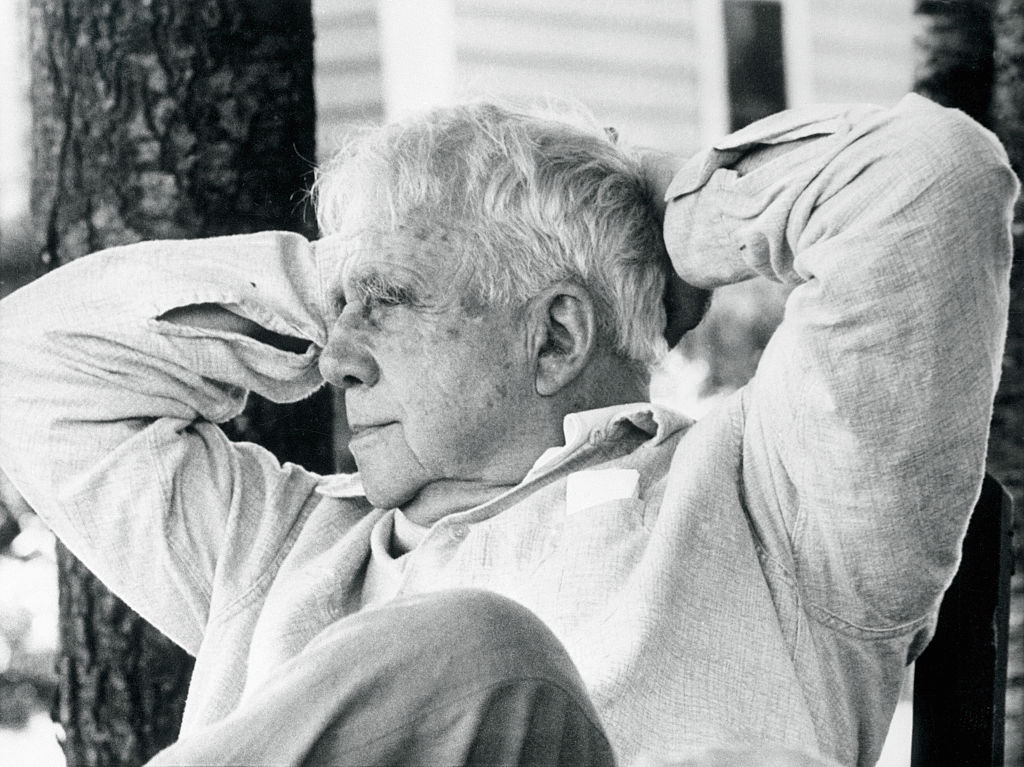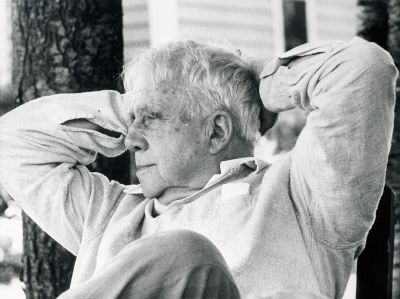When readers think of modernist poetry, chances are that T.S. Eliot’s masterpiece “The Waste Land” comes to mind. That poem—which celebrated its centenary last year—intentionally defies easy comprehension, yet in the decades since its publication it has escaped the poet’s notions of high culture and infiltrated pop music, graphic novels, and movies alike. “The Waste Land” is darkly alive, fitting Ezra Pound’s definition of a classic: containing a “certain eternal and irrepressible freshness.”
A smaller but no less important celebration is taking place this year for another modernist classic, Robert Frost’s New Hampshire. Eliot understood Frost and regarded him highly; Frost returned the favor by dismissing Eliot (as he dismissed most contemporaries not named Robert Frost). New Hampshire, however, is worth revisiting as much as “The Waste Land.” It complicates notions of modernism by being deliberately popular, but it is arguably just as dark, just as skeptical and strange as Eliot’s poem.
Published in October 1923, New Hampshire was Frost’s fourth collection of poems, and won him the first of his four Pulitzer Prizes—a still unbroken record for a writer in any genre. The success of this book would lead to lucrative publishing contracts, as well as sinecures at the University of Michigan and Amherst. He was at 49 a fully established poet, as popular and successful as it was possible for a pre-internet poet to be.
Frost’s popularity and success, however, contrasted with the many personal sorrows in his life. By the time of New Hampshire’s publication, he and his wife Elinor had lost two of their six kids: their first-born son to cholera and their youngest daughter just one day after her birth. In 1920, Frost’s sister, Jeanie, was committed to an asylum. More tragedy ensued in the decades that followed, including the deaths of his daughter Marjorie, his son Carol, and Elinor herself. Some of Frost’s poems, early and late, indirectly reflect these griefs, but he was rarely openly confessional. Our greatest writer of verse narrative, he often wrote of loss and grief through the lives of rural characters, a modern response to Virgil’s Georgics.
New Hampshire contains at least one poem that is still famous all over the globe: “Stopping by Woods on a Snowy Evening,” one of the most perfect short lyrics in English. It’s a poem that shouldn’t work, according to our contemporary taste, where simplicity and metrical regularity are regarded as old-fashioned. “Whose woods these are I think I know,” Frost writes. “His house is in the village, though …” You can almost hear Bugs Bunny tapping a paw to the poem’s thumping iambs.
But Frost understands that even a regular meter is not a simple thing, because words bend and blend with their sounds. The poem works by its complex tone, the most difficult part of any poem to describe. His third line changes the rhyme: “He will not see me stopping here …” Then he returns to it: “... To watch his woods fill up with snow.” The “here” rhyme is picked up in the second stanza, and we soon realize these are linked quatrains—a modern poet’s use of the Rubáiyát stanza. Even this deceptively simple lyric retains a whiff of mystery concerning human and inhuman points of view, the position of someone pausing in a nearly silent world, caught out on a journey. When Frost repeats his final line—“And miles to go before I sleep”—it becomes an incantation we can hear both literally and figuratively.
The 43 other works surrounding “Stopping By Woods” display a varied range of subjects and approaches unmatched by any other poet of the time. The opening section of New Hampshire, comprising only the title poem, is a whimsical essay in verse, meditating on poetry and place. If Shelley had met a traveler from an antique land, Frost has met them from Arkansas and California and other states, wondering at their regional fixations and what might make New Hampshire distinctive in literary terms. Frost’s tone is mockingly affectionate, questioning the whole literary enterprise: “No wonder poets sometimes have to seem / So much more business-like than business men. / Their wares are so much harder to get rid of.”
Part II of the book, called “Notes,” contains short narratives with an impressive range of characters and subjects. The opening meditation, “A Star in a Stone Boat,” demonstrates, again through tonal irony, that Frost is not dismissive of awe at the universe so much as the self-aggrandizement of those who claim to understand it. His fondness for astronomy returns in the beautiful precision of “The Star-Splitter,” about a neighbor who acquired a telescope:
We spread our two legs as we spread its three,
Pointed our thoughts the way we pointed it,
And standing at our leisure till the day broke,
Said some of the best things we ever said.
This isn’t a waste land, but a location just as unknowable, if more affectionately rendered. Frost maps the human position, example by example, always skeptical about knowledge and beliefs.
“The Witch of Coös,” one of two poems about witches, becomes a great comic ghost story, rivaling Robert Burns’ “Tam o’ Shanter.” Here a traveler is beguiled by the confessions of a mother and son about the skeleton that lived in the basement, and now resides in the attic:
It left the cellar forty years ago
And carried itself like a pile of dishes
Up one flight from the cellar to the kitchen,
Another from the kitchen to the bedroom,
Another from the bedroom to the attic,
Right past both father and mother, and neither stopped it.
If Eliot’s “The Waste Land” has “That corpse you planted last year in the garden,” Frost, too, has a crime requiring expiation.
Among the great lyrics in “Grace Notes,” the third section of New Hampshire, “Fire and Ice” might be the most prescient, long predating Oppenheimer’s bomb and our apocalyptic visions of climate change:
Some say the world will end in fire,
Some say in ice.
From what I’ve tasted of desire
I hold with those who favor fire.
But if it had to perish twice,
I think I know enough of hate
To say that for destruction ice
Is also great
And would suffice.
Choose your ending: It’s an ending all the same.
Then there’s “For Once, Then, Something,” a poem Frost had published in Harper’s in 1920. He told the scholar George R. Elliott in a letter that this poem in particular was “calculated to tease the metrists.” I myself first read it as a rough pentameter verse, until I learned from a Latinist that the poet was writing classical hendecasyllabics—a suitable meter, because it’s an unexpected one, for a poem about fooling and being fooled.
Here the poet stands accused of kneeling at well-curbs, staring at his own reflection in the water far below. But Frost is no more staring at his own reflection than the rest of us are when we desire and aspire and proclaim and assert. It is now customary to take this poem as a key to all of Frost’s work. “Once,” he teases his readers (emphasis in the original), he did see something beyond his reflection, something deeper down in the well, “a something white, uncertain, / Something more of the depths—and then I lost it.” There it is again, the quivering, vanishing dream of knowledge: “What was that whiteness? / Truth? A Pebble of quartz? For once, then, something.”
Frost made meters that freshen speech. His great lyric “To Earthward” begins, “Love at the lips was touch.” The line catches sensation in the moment of its dawning, and the poem as a whole evokes the pain and beauty of living in a body:
Now no joy but lacks salt
That is not dashed with pain
And weariness and fault;
I crave the stain
Of tears, the aftermark
Of almost too much love,
The sweet of bitter bark
And burning clove.
It’s the kind of human note of which T. S. Eliot was incapable, estranged as he was from his own living body. And it makes Frost in his own terms a poet for the ages.





Please note that we at The Dispatch hold ourselves, our work, and our commenters to a higher standard than other places on the internet. We welcome comments that foster genuine debate or discussion—including comments critical of us or our work—but responses that include ad hominem attacks on fellow Dispatch members or are intended to stoke fear and anger may be moderated.
With your membership, you only have the ability to comment on The Morning Dispatch articles. Consider upgrading to join the conversation everywhere.